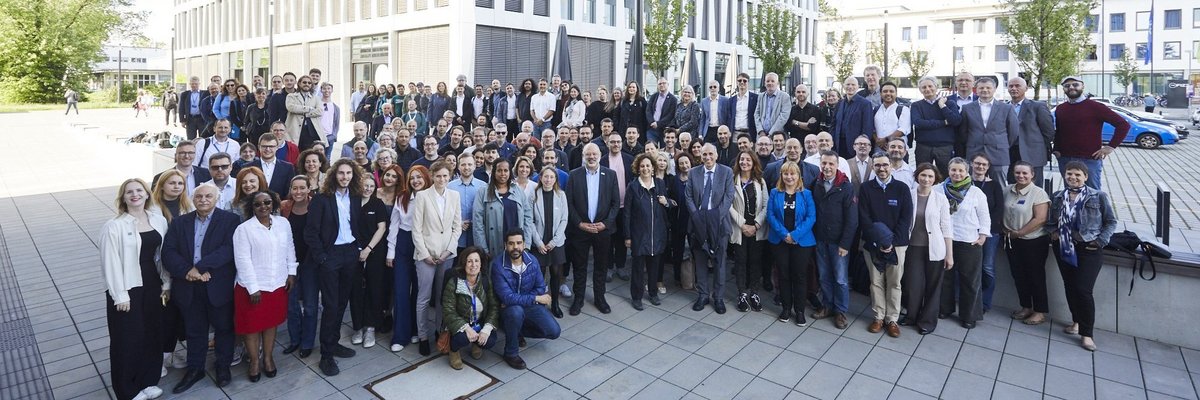From 2 - 6 June 2025, a European idea will take shape on the campus of Darmstadt University of Applied Sciences (h_da): Guests from universities all over Europe will come together to bring their vision of a ‘European University’ to life: For one week, lecturers, students and administrative staff from nine EU countries will discuss across language and cultural borders how their universities can deepen cooperation at all levels. The long-term goal: a united European university with campuses in nine countries.
By Christina Janssen, 21.5.2025
The EUT+ alliance, in which h_da has been involved since 2020, is already bringing tangible benefits: students can easily complete a stay abroad at one of the nine partner universities, academics are joining forces at European level, pooling expertise and jointly acquiring third-party funding. Employees can spend time with colleagues abroad, take language courses, network internationally and exchange ideas. The overarching aim behind this is to strengthen European unity, promote diversity, innovation and interdisciplinarity across borders and contribute to solving global challenges by working together.
The process leading up to the establishment of a European university will take years - and is a highly complex endeavour: Study programmes and degrees must be standardised step by step, a common IT infrastructure created and administrative processes harmonised. Numerous ‘work packages’ are therefore dealing with different aspects of this huge project. The meeting in Darmstadt, one of six intensive working weeks this year, has a correspondingly tight programme. The focal points: Research, digital transformation and entrepreneurship.
One of the highlights of the week is an event on Tuesday, 3 June. Student teams will present their start-up ideas on the ground floor of the h_da tower block in Schöfferstraße from 1.30 pm. Since February, a number of teams at all nine partner universities have been working on business ideas as part of the first ‘EUT+ Incubation Programme’. Now the local winners will compete in the final pitch in Darmstadt and an expert jury will award prizes to the three best start-up ideas. At the same time, a ‘TechShowCase’ will offer insights into the research work of the European network in the field of artificial intelligence. The event is also intended as a stimulus and networking event for the public. Guests are welcome and can register here.
During the ‘EUT+ Darmstadt Week’, scientists from all nine partner universities specialising in the field of robotics will come together for the first time at the Department of Computer Science. They want to identify joint research topics, explore collaborations and, if necessary, set out to establish a European research group. This has already happened in a similar way within the European University of Technology, for example in the field of nanotechnology.
On 4 and 5 June, the European University of Technology is also organising the scientific conference ‘Knowledge in the age of digital re-/production’ together with the Darmstadt-based Schader Foundation. Researchers from all over Europe will address the question of how digitalisation is changing the production, dissemination and use of knowledge. The organisers are also inviting the public panel discussion ‘AI, authorship and human creativity in education, science and art’ on 4 June at 6.30 pm at the Schader Foundation. Both events are organised by the European Culture and Technology Lab (ECT Lab+), which aims to strengthen research in the humanities and social sciences within the EUT+ university alliance, and by the Schader Foundation.
Another highlight: to coincide with ‘Europe Week’ on the h_da campus, almost 40 students from Troyes, Limassol and Darmstadt will come together on Thursday, 5 June and slip into the role of MEPs for a day: In a simulation game, the young people will debate the European ‘Green Deal’. They spent an entire semester preparing for this in the online course ‘Become a member of the European Parliament for a day’ and visited the European Parliament in Strasbourg with their lecturers before the meeting in Darmstadt. The ‘Simulation Game’ then gets (almost) serious: the day is opened by State Secretary Christoph Degen from the Hessian Ministry of Science, the students are divided into six political groups and have to convincingly represent the corresponding political positions in the debate. At the end, various aspects of the Green Deal such as mobility, energy and sustainable product design are put to the vote. By then at the latest, Europe will have fully arrived in Darmstadt - and many young people will be right at the centre of Europe.
Background: The European University of Technology Alliance (EUT+) is one of around 65 alliances of this kind that are funded by the European Union as part of the ‘European Universities Initiative’. The EUT+ alliance includes nine universities from nine EU countries with a total of 110,000 students:
- Cyprus University of Technology (CUT, Cyprus)
- Darmstadt University of Applied Sciences (h_da, Germany)
- Riga Technical University (RTU, Latvia)
- Technical University of Cartagena (UPCT, Spain)
- Technical University of Cluj-Napoca (UTCN, Romania)
- Technical University of Sofia (TUS, Bulgaria)
- Technological University Dublin (TU Dublin, Ireland)
- University of Cassino and Southern Lazio (UNICAS, Italy)
- University of Technology of Troyes (UTT, France)
